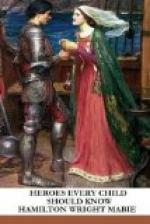Just what this invention was I cannot explain. But if you ever go into the patent office at Washington, ask to see Abraham Lincoln’s patent for transporting river boats over snags and shoals. The wooden model is there; for, so pleased was Lincoln with the success that he thought seriously of becoming an inventor, and his first design was the patent granted to him in 1849, the idea for which grew out of this successful floating of Offutt’s flat-boat over the river snags at New Salem nineteen years before.
Once again he visited New Orleans, returning home, as before, by steamboat. That voyage is remarkable, because it first opened young Lincoln’s eyes to the enormity of African slavery. Of course, he had seen slaves before; but the sight of a slave sale in the old market place of New Orleans seems to have aroused his anger and given him an intense hatred of slave-holding. He, himself, declared, years after, that it was that visit to New Orleans, that had set him so strongly against slavery.
There is a story told by one of his companions that Lincoln looked for a while upon the dreadful scenes of the slave market and then, turning away, said excitedly, “Come away, boys! If I ever get a chance, some day, to hit that thing”—and he flung his long arm toward the dreadful auction block—“I’ll hit it hard.”
Soon after he returned from his flat-boat trip to New Orleans he had an opportunity to show that he could not and would not stand what is termed “foul play.” The same Mr. Offutt who had hired Lincoln to be one of his flat-boat “boys,” gave him another opportunity for work. Offutt was what is called in the West a “hustler”; he had lots of “great ideas” and plans for making money; and, among his numerous enterprises, was one to open a country store and mill at New Salem— the very same village on the Sangamon where, by his “patent invention,” Lincoln had lifted the flat-boat off the snags.
Mr. Offutt had taken a great fancy to Lincoln, and offered him a place as clerk in the New Salem store. The young fellow jumped at the chance. It seemed to him quite an improvement on being a farm-hand, a flat-boatman, or a rail-splitter. It was, indeed, a step upward; for it gave him better opportunities for self-instruction and more chances for getting ahead.
Offutt’s store was a favourite “loafing place” for the New Salem boys and young men. Among these, were some of the roughest fellows in the settlement. They were known as the “Clary Grove Boys,” and they were always ready for a fight, in which they would, sometimes, prove themselves to be bullies and tormentors. When, therefore, Offutt began to brag about his new clerk the Clary Grove Boys made fun at him; whereupon the storekeeper cried: “What’s that? You can throw him? Well, I reckon not; Abe Lincoln can out-run, out-walk, out-rassle, knock out, and throw down any man in Sangamon County.” This was too much for the Clary Grove Boys. They took up Offutt’s challenge, and, against “Abe,” set up, as their champion and “best man,” one Jack Armstrong.




